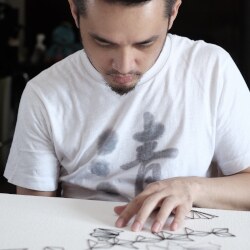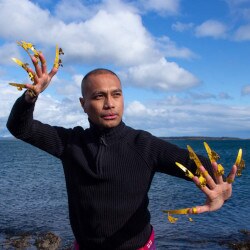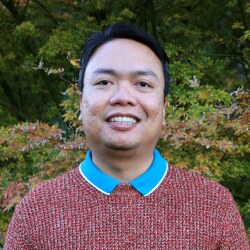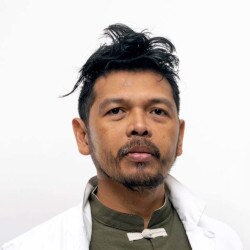Episode 9 – Mount Makiling

Featuring:
Datu Arellano
Donna Cher dela Cruz
Dennis Gupa
Karlene Moreno Hayworth
Reagan Romero Maiquez
Ears on/of Makiling
Episode 9 of the Timezones podcast series, co-initiated and co-produced by Norient and the Goethe-Institut. This episode explores the stories and sounds of Mount Makiling, located 80 kilometres south of the Philippine capital of Manila. Makiling is the sacred site of local legends, the setting for numerous classical works of literature, and a pilgrimage destination for many mystics. And it is the home of many artists and arts students.The University of the Philippines Los Baños was established in 1909, covering one side of the mountain. In 1977, Imelda Marcos, the notorious dictator’s wife, built the National Arts Center and the Philippine High School for the Arts on its slopes.
For many Filipino artists, the mountain is the ground in which their artistic roots were planted –despite moving back to the urban metropolises, to other islands of the archipelago, or to other continents, the mountain is a wormhole through which many artists’ pasts and presents intertwine. Makiling is the constant drone and its winds and rains the ostinati that their present and future experiences of nature, the forest, art, theatre, poetry, and music are tuned to.
Most of my sensorial experiences in my adulthood are calibrated in reference to how I experienced life in Makiling. When the strong North Holland winds blast against me while biking, I find myself back on the slope of the mountain with a monsoon wind blowing against my face. The sound and smell of the first summer rain in Germany transport me back to my residential cottage in the mountain. Makiling, in this sense, is a compass for me.
My name is meLê yamomo.
I studied theater and music composition at the Philippine High School for the Arts in Mount Makiling. I asked the help of a friend whom I’ve known for almost 25 years in creating this piece. Some of my most cherished life memories were spent with him when, as teenagers, we lived together in the boarding school up on the mountain.
[2:01] Nono Pardalis
I’m Nono Pardalis. I am a writer and video editor. I studied creative writing in Makiling, spent my college at a university at the foot of Mount Makiling, and now I live in Calamba City, which is also located at the foot of that same mountain, and together with Mele, we spoke to former classmates and artist friends, and here they are.
[2:30] Dennis Gupa
I am Dennis Gupa and I am a theater director. I first visited Mount Makiling when I was a high school student in the early 90s. I was stunned by the fecundity of the nature. You know, I grew up in Manila, which was a bustling and crowded city. But when I first saw the University of the Philippines in Los Baños, which is located at the foot of Mount Makiling, my imagination of time and space suddenly expanded. After a decade, I went back as an assistant professor at the UPLB’s Humanities department.
[3:04] Datu Arellano
I’m Datu Arellano. Transdisciplinary Artist. I graduated from Makiling in 1998, major in visual arts.
[3:16] Donna Cher dela Cruz
I am Donna Cher dela Cruz. I am a lawyer by profession. I am a graduate of the Philippine High School for the Arts in 1997 and I majored in music/piano.
[3:26] Karlene Moreno Hayworth
I’m Karlene Moreno Hayworth. I’m a British-Filipino soprano from Manila, Makati, Philippines, and I now live in London, England.
[3:37] Nono Pardalis
For this piece, I went back to Makiling to try and capture its sounds. You will also hear one of my poems. Well, it’s in Filipino, but we’ve recorded an English translation... sort of. It’s a rough translation of the poem.
[4:00] Reagan Maiquez
So the name of the dog is Kiki. Kiki in the Karen language is cute. Kiki is a German shepherd. I don’t know if you can hear in his barking that it’s not a bark of aggression. Or, you know, expressing himself as a dog. That’s how I hear Kiki. Anyway, so I am Reagan and I live in Melbourne. I came here in 2011. I took up a PhD. My specialization is in theater and performance studies. But before that, I was teaching at the University of the Philippines, Los Baños. And I was living on one of the slopes of Mount Makiling. Now you can hear the dog again barking.
[4:46] meLê yamomo
In this piece, you’ll hear me asking questions now and then, but mostly I will be behind the microphone with the sound control board or composing.
[4:58] Dennis Gupa
There’s a story of how Mariang Makiling, the maiden of the mountain, captures the hearts of young men and seduces them to live in the mountains with her. And of those young, educated men from Manila or even America who got their degrees, who taught there and established a university. As you know, it was established by Copeland, and he came there as a young man and he re-rooted himself and established UP Los Baños. I thought that was also the history that happened to me. I was seduced and I was lost. Being lost is the most beautiful thing that could happen to you in Los Baños because there’s a certain initiation. You’re being initiated into new imaginaries and life. Many young men at U.P. Los Baños decided to get married and establish their families there. But, you know, I left as a single man in 2015, but I gave birth to many theatrical productions that I never thought I would be able to create. Thanks to Mariang Makiling.
[6:05] Nono Pardalis
| Questions Landslide at your foot I waited, eyes closed naked no answer |
Dumadausdos ang mga tanong sa paanan mo naghintay ako pikit- mata walang saplot walang sagot |
[6:21] meLê yamomo
How did Makiling shape your experiencing of the world?
[6:26] Karlene Moreno Hayworth
Growing up in Makiling, I remember every single day, I made sure that I woke up at 5:00 in the morning. And I’m one of those really, really, early people to walk to school from the dorms, eat by myself, because that quiet actually influenced how I go about my life.
[6:45] Datu Arellano
The birds.
[6:45] Reagan Maiquez
The birds in the morning.
[6:50] Dennis Gupa
You wake up in the morning hearing the kindness of birds, as Merlinda Bobis would describe it.
[6:56] Karlene Moreno Hayworth
That is when I would create ideas, get inspired.
[7:01] Reagan Maiquez
The chirping of insects.
[7:03] Datu Arellano
The crickets.
The sound of crickets would actually mark that I had to rest and stop working because it was so loud and harmonious that you just allowed yourself to be part of that musicality.
The wind.
[7:17] Karlene Moreno Hayworth
The sound of rain is just so calming.
The sound of silence in the breeze or the leaves rustling, which is sort of, let’s just say, soothing to you physically.
[7:54] Donna Cher dela Cruz
The sound that stuck with me was the sound of the music room. Imagine all music majors, one room beside another one, and there’s around 20 of us playing. So all that sound. It’s actually a cacophony already. But you have to make sense of it and find the sound that you’re making.
[8:38] Nono Pardalis
| Was that you? Who sent the leaves in the wind to coax me I float Gracefully on the sweating soil The birds. |
Ikaw ba yon? Ang nagpadala ng sari-saring dahon sa hangin para suyuin ako at isayaw sa ibabaw ng lupang sumisingaw |
[9:02] Dennis Gupa
yung tuko. What is tuko in English?
[9:05] Donna Cher dela Cruz
The gecko.
[9:06] Datu Arellano
The geckos.
[9:08] Dennis Gupa
Ang lakas ng kanyang sound. It’s deeply baritone. I think Makiling also taught me impermanence and to accept impermanence with integrity. The sound of the tuko, you only hear the sound in one particular period temporarily, and then you have to be present and engage with the baritone-ness of that sound. And if you don’t, you forget that desire of the tuko to communicate with you. And if you treat that sound and the presence of the tuko [like that], then I don’t think that you are experiencing your full human being. Because you’re forgetting other sounds, other entities, you know. And the impermanence of that is present. But then again, the other night, the tuko is still there. So there’s also the enduring sound. It will happen at one particular time. So you have to be there because it will be gone any time soon. But that’s OK. The following night, you will be visited again, or not even visited because it’s a member of that house. I think that we have forgotten that, that the tuko is also a member of that family.
[10:22] Reagan Maiquez
As you know, Mount Makiling is a sleeping and dormant volcano. And underneath this wonderful geography, there’s a lot of movement as well. A lot of magmatic kind of movement, you know, we don’t hear. But if we become meditative, you know, I would just imagine that the ground is moving beneath my feet. I imagine that movement, but it’s sound, physically it’s a sound. It can be sensed and perceived as a sound.
[10:57] Datu Arellano
My mind is constantly making sound.
[11:04] Nono Pardalis
| Was it you – not I – who sculpted the face on that indestructible rock? Was the face yours? Or mine? |
Ikaw ba – at hindi ako – ang humubog ng mukha sa batong di matibag-tibag? Sa’yo ba – at hindi akin – ang mukha? |
[11:20] Donna Cher dela Cruz
I often find myself reminiscing about that particular sound in city life.
[11:29] Datu Arellano
There’s that constant hum in my head.
[11:38] Reagan Maiquez
I am practicing mindfulness so that I become more sensitive to the sounds of the place. Not just because I want to know what sound it is, but how the sound is responding to my silence, and also how I respond to those sounds in the way that, kind of, the relationship between the outer and the inner becomes one organism or an organism living in a physical world where there are sounds.
[12:16] Nono Pardalis
| Was that you? Who gently pulled the little bells in the morning Wove sounds on the rainy night |
ikaw ba yon? Ang marahang humihila ng mga kuliling sa umaga Ang humahabi ng mga tunog Sa maulang gabi |
[12:34] Datu Arellano
Most of my best ideas come about because of silence.
[12:41] Karlene Moreno Hayworth
That gives you time to just regroup your, your own, let’s say, fatigue, your own stress.
[12:47] Datu Arellano
All of these questions rush in mixed feelings. All sorts of ideas. So all of these things are colliding with each other. And that’s the moment when I say, Oh, I have to do something, I have to process all of these things.
[13:12] Donna Cher dela Cruz
When you hear many different kinds of sounds and you have to make sense of it and still find your way through, where am I going? What am I going to do today?
[13:21] Datu Arellano
That combination of order and chaos is something that, you know, drives you as an artist.
[13:30] Donna Cher dela Cruz
I think that goes the same for what I do now. It’s standing between chaos and order in trying to make sense of how to survive and how to go through it.
[13:41] Datu Arellano
In my practice, I think one can really see the two opposing forces of chaos and order. So nature and human politics, and the desire to find a space in between, the desire to find balance.
[14:06] Dennis Gupa
You know, in the language of my father, Waray, we have the word pamati – to listen. To listen means you understand your emotion and the emotion of the one speaking. I found that in Makiling. I thought that Makiling was always in the state of pamati – the listening state. Because while the mountain is listening to me, I also feel the emotion of the mountain. It doesn’t have any judgment and that emotion liberates me. It allows me to be part of that emotion. It respects also my emotion. I don’t feel imprisoned when I am in Makiling because again, the kind of openness, the listening mountain is so present.
[14:57] Nono Pardalis
| You’ve been listening, I know to every breath, every sigh to every bang, beat of reckless youth |
Nakikinig ka, alam ko Sa bawat hinga at buntong-hininga Sa bawat kabog at tibok ng mapusok na kamusmusan |
[15:11] Dennis Gupa
When I said Listening Mountain, meaning there’s the quietness, the solitariness, but also the living sound – the sound of the bird, the sound of the brooks, the flat rocks, you have the flat rocks, there’s water there, you just go there and just listen to the sound of the environment. And I feel healed and cleansed because I feel the emotion of Mount Makiling.
[15:42] Nono Pardalis
| You’ve been listening, I know Our secrets planted in your silence |
Nakikinig ka, alam namin Nakatanim ang aming mga lihim sa iyong katahimikan |
[15:55] Donna Cher dela Cruz
We also find the same struggle between order and chaos with our own relationship because of the differences in the practice. He’s the artist. I’m the lawyer. Not that he’s chaotic, but he’s more of the free-spirited one engaged in the arts, meaning the rules don’t necessarily apply black and white. And I’m the one who’s in the part that has everything down pat to black and white. So there’s a struggle there in terms of how we decide on things.
[16:30] Datu Arellano
In my practice, that process is very crucial. It’s very important – moments of silence so that my head has the opportunity to be noisy. And then I have that chance to process all of that data, all of that noise, all of that sound.
[16:51] Donna Cher dela Cruz
I think Makiling comes in in the sense that we are grounded by our collective experience. So at the base of it all, we understand that we have a commonality. And there are principles, grounding principles that we agree with, although our processes are different.
[17:12] Dennis Gupa
So Mount Makiling definitely has this kind of pamati quality – listening while being cognizant of one’s emotion. It is a very empathetic listening. And so when you’re empathetic and listening, you, you find liberation. You know, assertion is no longer valuable. And what is important is now the connection and the relationality that would arise out of that empathic listening.
[17:40] Karlene Moreno Hayworth
Makiling is very, very important to me as a place and also as a part of my life where I had my grounding. When I say my grounding, it really did expose me to a lot of different facets of life: how to be independent, to learn about other art forms and also to embrace, you know, being in this beautiful place wherein you're allowed space, to seek space to grow.
[18:09] Nono Pardalis
| You’ve been listening, I know Our secrets planted in your silence |
Nakikinig ka, alam namin Nakatanim ang aming mga lihim sa iyong katahimikan |
[18:22] Donna Cher dela Cruz
What I do now is not in the arts. My profession now is law. But the discipline, the training, the techniques that I learned in Makiling while learning the art that I majored in, are still helpful in the profession that I do now.
[18:41] Karlene Moreno Hayworth
I am a freelance opera singer.
I would say a freelance musician, because I would say, aside from singing, I cantor, and I'm also a conductor and I also teach singing and piano.
[20:15] meLê yamomo
Metropolises, especially cities with layers upon layers of colonial histories, are replete with institutional conventions and expectations for its citizens, compliance with urban choreographies and social compositions. How did Makiling emancipate you from these implicit social play scripts?
[20:44] Karlene Moreno Hayworth
Makiling, actually, I think, helped in me with learning how to focus, how to actually listen to what’s going on around me and having that, let’s say, that quiet, especially at night when you just hear the crickets. Finding your own identity as well, asking your questions.
[21:02] Donna Cher dela Cruz
A lot of the process and the training that we went through in Makiling was to create something that is true to ourselves. We had that freedom in that space to create something that was true to ourselves and we wanted to keep that.
[21:22] Datu Arellano
I play music visually. It’s important for me to see an interface and then that interface will inform me how I should play the music.
[21:40] Donna Cher dela Cruz
The process of how you go through all the chaos does not necessarily mean that you lose your way through it. And I think it's an art in itself to be able to survive and come up with an output.
[21:56] Dennis Gupa
People who are also interested in theater, like the scientists, it allowed me to experiment with theater, for example, inside the kitchen. We did a performance in collaboration with the nutritionist and we transformed the kitchen and the laboratory into a place of performance, with 30 people as the audience. We created theater in a burnt chemistry building. The crickets are also part of the cast. And you can’t say «No, cricket. Don’t do that because our actors are now doing their monologue», but they’re a part. You cannot control that. So Makiling somehow gave me these kinds of new visions and bold visions of doing theatre that’s somehow difficult to exercise in Manila because there’s a certain expectation already. And that expectation was established by certain people, institutions and even your language, because our way of doing theater in Manila is still prominently English. You speak in a way that sounds like American or European, but that’s difficult for me because I came from Barangay Piñahan, a small barangay. So I had to find myself. Carve my pathway to be able to understand other practices and develop my own practice.
[23:32] Reagan Maiquez
The mountain, I think, amplifies itself through its own ways, through how the mountain is physically made of, of the organisms or the lives around that place, but also the silence that one may experience being in that place. Currently, I use poetry. I use language. But language is also made up of sound, particularly in poetry. It’s how poetry also works with silence in between the words, in between utterances. And when you become more silent, then the world is amplified.
[24:31] Datu Arellano
I have this ongoing project named Tahigami. It’s a combination of two words – the Filipino word for tahi, which means stitch or to stitch, and then gami, from origami, Japanese, which means paper. So literally, literally it means stitching on paper. I found a way of creating music using these geometric drawings. After creating that system of creating music using geometry and graph theory, I was able to make electronic instruments. So I’ve been using those instruments to make my music.
[25:40] meLê yamomo
We’ve spoken about our memories of the sounds of Makiling – about how you heard the mountain. Do you ever wonder how Makiling was listening to you?
[25:54] Dennis Gupa
Yeah, that’s a beautiful question. That question keeps our relationship with nature. Sometimes we think of it as an object and even a subject of our artistic endeavoring. But your question raptures this concept of equity and equality or even giving agency to nature. I have not really thought about that deeper. But I think it is a question that every artist should engage with. Because every time I look at the trees and the flowers, even the ocean, they don’t have any shame of being them. They are flowers, right? They are process. They are identities of themselves. And would it be important to learn from them and to listen to them? To understand what kind of other knowledge could be presented to us by them? And there’s also a tendency to make them human, which I think also unfair. Because we are imposing our understanding of them as human beings. But to listen to them is to understand them as them, as flowers. Not as human. Because they demonstrate the truest meaning of constancy, growth, and evolution. And I think that one should master how to engage with them with humility.
[27:35] Karlene Moreno Hayworth
Funnily enough, it feels like some sort of artistic home. Makiling is a very special place for human beings, artists, to be, let’s say, a full person who’s capable of making their own creative judgment, to be unapologetic for their own creative choices.
[27:59] Dennis Gupa
I could say that it is a place of imagination. It is a place of collaboration. It is a place where you need to submit yourself and learn to be humble. We are occupying it for our own human endeavor so that sometimes we forget that originally that land was occupied by the tuko. The cacophonies of those sounds just gave me the idea that I have to respect my body and I have to respect this world. I am now in tune and I have to be in sync with this and start thinking of productivity.
[28:50] Nono Pardalis
| We were once called the voice echoed since then Resonating within the secluded corner in our hearts That voice? Was it yours – not ours? |
Minsan kaming tinawag Umalingawngaw mula noon ang boses Umaalingawngaw sa liblib na bahagi ng aming dibdib Sa’yo ba – hindi sa amin – ang tinig? |






Contact: mele@meleyamomo.com

Contact: nononono_ph@yahoo.com
Bonus Material
Makiling’s Silence: A Memory, a Source, a Force of Creative Lives and Ceaseless Meanderings
moderated and produced by Dayang Yraola
Dayang Yraola, a Manila-based teacher, curator, sound artist, and sound archivist, retrieves her long-lost memories of living in Mt. Makiling in Los Baños, Laguna, in the early 2000s. She engaged in a conversation with three alumni of the Philippine High School for the Arts, the school at the heart of Mt Makiling, namely meLê yamomo, a Europe-based scholar and artist; Donna Cher dela Cruz, a Manila-based lawyer; and Nono Pardalis, a Laguna-based writer. Sharing their individual memories helped the participants of this Bonus Talk locate the place of Mt Makiling in many past and present episodes of their lives and their practice.

Credits
Credits:
Artistic Editor: Abhishek Matur
Project Management: Hannes Liechti
Video Trailer: Emma Nzioka
Jingle Voiceover: Nana Akosua Hanson
Jingle Mix: Daniel Jakob
Mastering: Adi Flück, Centraldubs
Artwork: Šejma Fere